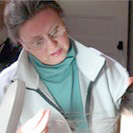Angels & Demons
 Today, Kate shares her lice-related struggles and solution:
Today, Kate shares her lice-related struggles and solution:
“When I was in second grade, a friend and I were sent home from school with matching cases of headlice. I still remember the head mistress using a pencil to separate the strands of my hair as she checked me over, the dismayed look on my mother's face when she picked me up, and the feeling of liberation at being out of school in the middle of the day without actually being ill or in trouble. In my memory - recently confirmed by my father - my mother treated my hair with a medicated shampoo, washed all of the linens and stuffed animals in the house, and life went on as normal. Not so for my own recent parental experience of headlice, a saga that has now gone on for more than two months and pushed me to limits of frustration and despair generally reserved for much more important things but recently triggered by tiny, pernicious, and seemingly indestructible insects.
When my daughter first started scratching her head and neck, the weather was still cold and I assumed it was dry scalp, an affliction to which I am also prone. I blithely changed her shampoos and thought nothing more of it, until one fateful morning when the sun happened to hit her hair in a certain way and…my heart stopped. What were those things moving in her hair? And oh my god - there were MORE of them! Suddenly understanding all too well the cause of her itching, I geared up to repeat my mother's actions of 29 years ago: medicated shampoo, laundry, done. Or so we thought. The scratching came and went. More medicated shampoo, for all members of the family. More research. Efforts at combing. More scratching, but also some itch-free lulls. We thought we were in the clear until last week, when she was sent home from school and I decided that it was time to get serious. We were under attack, and it was time to bring out the heavy artillery.
It turns out that, in the decades since my own run-in with them, lice have evolved to be able to withstand most of the medications currently available to combat them. So, while a good dose of a medicated shampoo is still a standard part of any anti-lice treatment - in moderation only, given the toxicity of the medication - the real work of getting rid of the little creepy-crawlies and their eggs must be done by hand: patient hours of searching and combing, under a bright light and with special brushes and clips. This is painstaking and time consuming, and leaves one terribly uncertain as to whether all of the lice and nits have really been removed. I tried my best to do it, but each effort left me more anxious. Was I getting them all? Were they multiplying right under my nose and I couldn't even tell? Would I have to cut off all my daughter's hair? Change schools? Move out of my apartment? Everyone had different advice - this comb, that comb, mayonnaise, vinegar, no never vinegar! Our stress built, as did the piles of laundry to be washed (on the highest of heats) and new lice-killing gizmos to be bought and tried. By her second full day out of school, I was on the verge of losing it, and something needed to change.
And then, salvation. I once again sought guidance from our pediatrician, who recommended The Nit-Picker. Based in suburban Boston, The Nit-Picker is the brainchild of a mother and entrepreneur who once faced down her own household case of headlice and decided there was a business to be had in it. She now employs a small team of 'nitpickers' who bring not only knowledge and experience but also serenity to an extremely frazzling situation. The woman who spent two hours calmly sorting through my squirmy daughter's head of infested hair is the closest thing that I can imagine to an angel on earth, and she has helped to restore some equilibrium to our lives.
Two last notes: First, when and if we encounter lice again, I will go immediately to the nit-picking option. I now regret having used so many toxins on the heads of my loved ones, particularly when the shampoos clearly weren't very effective. This is one situation where the old-fashioned route seems to be the best way to go. Second, if your child shows any signs of lice, have them checked - by a doctor or nurse, if need be - immediately. Lice spread like wildfire through schools and camps, and each family must do its part to try to slow it down by catching and treating it quick.”
